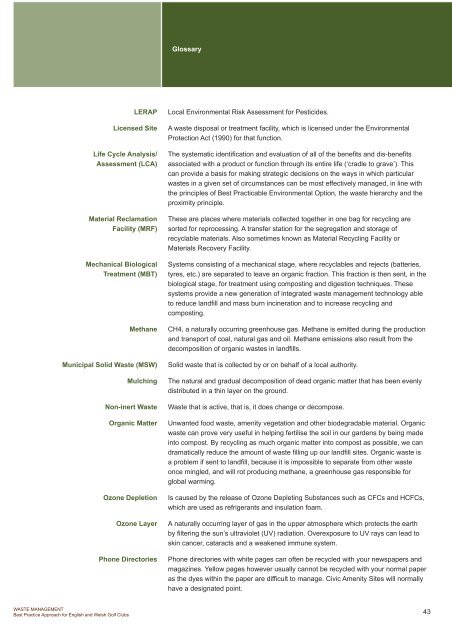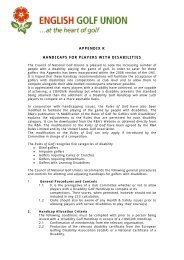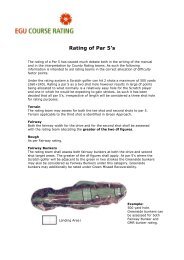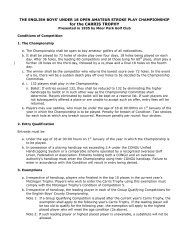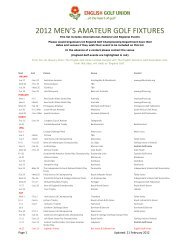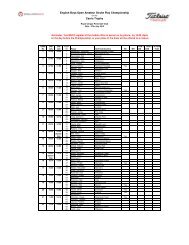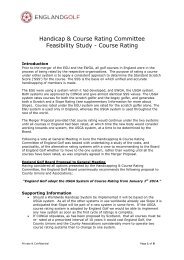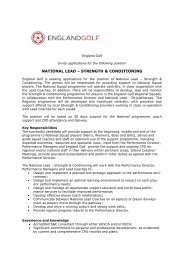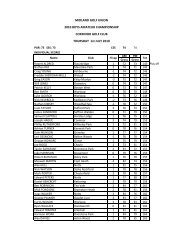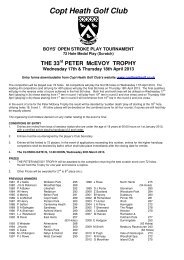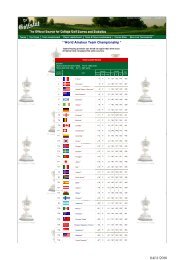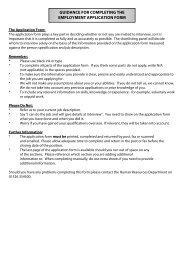Waste management - England Golf
Waste management - England Golf
Waste management - England Golf
Create successful ePaper yourself
Turn your PDF publications into a flip-book with our unique Google optimized e-Paper software.
Glossary<br />
LERAP<br />
Licensed Site<br />
Life Cycle Analysis/<br />
Assessment (LCA)<br />
Material Reclamation<br />
Facility (MRF)<br />
Mechanical Biological<br />
Treatment (MBT)<br />
Methane<br />
Municipal Solid <strong>Waste</strong> (MSW)<br />
Mulching<br />
Non-inert <strong>Waste</strong><br />
Organic Matter<br />
Ozone Depletion<br />
Ozone Layer<br />
Phone Directories<br />
Local Environmental Risk Assessment for Pesticides.<br />
A waste disposal or treatment facility, which is licensed under the Environmental<br />
Protection Act (1990) for that function.<br />
The systematic identification and evaluation of all of the benefits and dis-benefits<br />
associated with a product or function through its entire life (‘cradle to grave’). This<br />
can provide a basis for making strategic decisions on the ways in which particular<br />
wastes in a given set of circumstances can be most effectively managed, in line with<br />
the principles of Best Practicable Environmental Option, the waste hierarchy and the<br />
proximity principle.<br />
These are places where materials collected together in one bag for recycling are<br />
sorted for reprocessing. A transfer station for the segregation and storage of<br />
recyclable materials. Also sometimes known as Material Recycling Facility or<br />
Materials Recovery Facility.<br />
Systems consisting of a mechanical stage, where recyclables and rejects (batteries,<br />
tyres, etc.) are separated to leave an organic fraction. This fraction is then sent, in the<br />
biological stage, for treatment using composting and digestion techniques. These<br />
systems provide a new generation of integrated waste <strong>management</strong> technology able<br />
to reduce landfill and mass burn incineration and to increase recycling and<br />
composting.<br />
CH4, a naturally occurring greenhouse gas. Methane is emitted during the production<br />
and transport of coal, natural gas and oil. Methane emissions also result from the<br />
decomposition of organic wastes in landfills.<br />
Solid waste that is collected by or on behalf of a local authority.<br />
The natural and gradual decomposition of dead organic matter that has been evenly<br />
distributed in a thin layer on the ground.<br />
<strong>Waste</strong> that is active, that is, it does change or decompose.<br />
Unwanted food waste, amenity vegetation and other biodegradable material. Organic<br />
waste can prove very useful in helping fertilise the soil in our gardens by being made<br />
into compost. By recycling as much organic matter into compost as possible, we can<br />
dramatically reduce the amount of waste filling up our landfill sites. Organic waste is<br />
a problem if sent to landfill, because it is impossible to separate from other waste<br />
once mingled, and will rot producing methane, a greenhouse gas responsible for<br />
global warming.<br />
Is caused by the release of Ozone Depleting Substances such as CFCs and HCFCs,<br />
which are used as refrigerants and insulation foam.<br />
A naturally occurring layer of gas in the upper atmosphere which protects the earth<br />
by filtering the sun’s ultraviolet (UV) radiation. Overexposure to UV rays can lead to<br />
skin cancer, cataracts and a weakened immune system.<br />
Phone directories with white pages can often be recycled with your newspapers and<br />
magazines. Yellow pages however usually cannot be recycled with your normal paper<br />
as the dyes within the paper are difficult to manage. Civic Amenity Sites will normally<br />
have a designated point.<br />
WASTE MANAGEMENT<br />
Best Practice Approach for English and Welsh <strong>Golf</strong> Clubs<br />
43


